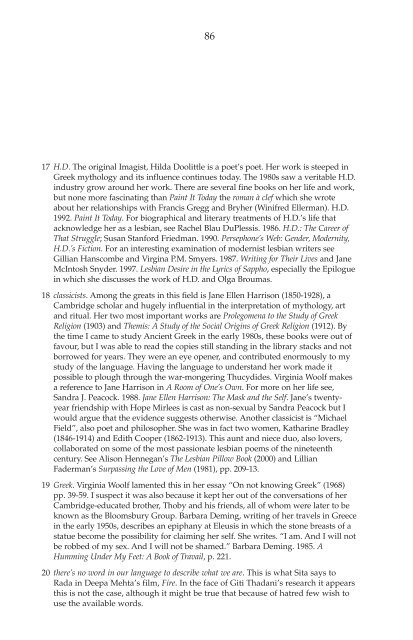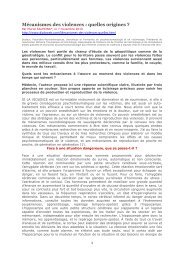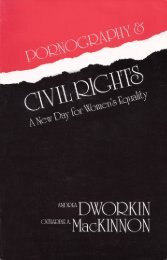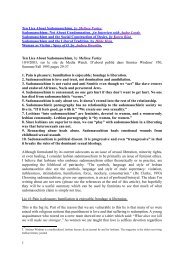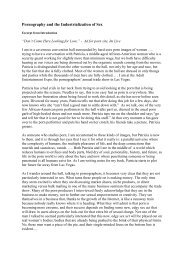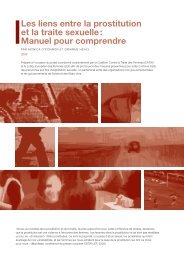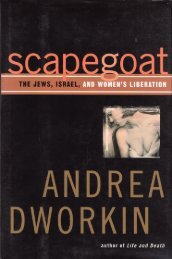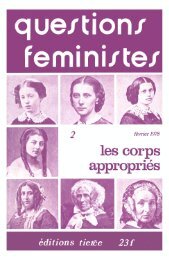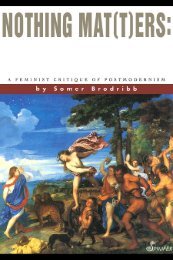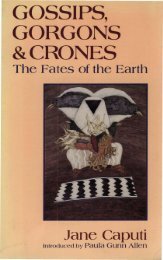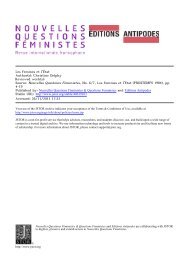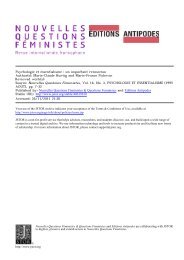Butterfly Effect - ressourcesfeministes
Butterfly Effect - ressourcesfeministes
Butterfly Effect - ressourcesfeministes
You also want an ePaper? Increase the reach of your titles
YUMPU automatically turns print PDFs into web optimized ePapers that Google loves.
86<br />
17 H.D. The original Imagist, Hilda Doolittle is a poet’s poet. Her work is steeped in<br />
Greek mythology and its influence continues today. The 1980s saw a veritable H.D.<br />
industry grow around her work. There are several fine books on her life and work,<br />
but none more fascinating than Paint It Today the roman à clef which she wrote<br />
about her relationships with Francis Gregg and Bryher (Winifred Ellerman). H.D.<br />
1992. Paint It Today. For biographical and literary treatments of H.D.’s life that<br />
acknowledge her as a lesbian, see Rachel Blau DuPlessis. 1986. H.D.: The Career of<br />
That Struggle; Susan Stanford Friedman. 1990. Persephone’s Web: Gender, Modernity,<br />
H.D.’s Fiction. For an interesting examination of modernist lesbian writers see<br />
Gillian Hanscombe and Virgina P.M. Smyers. 1987. Writing for Their Lives and Jane<br />
McIntosh Snyder. 1997. Lesbian Desire in the Lyrics of Sappho, especially the Epilogue<br />
in which she discusses the work of H.D. and Olga Broumas.<br />
18 classicists. Among the greats in this field is Jane Ellen Harrison (1850-1928), a<br />
Cambridge scholar and hugely influential in the interpretation of mythology, art<br />
and ritual. Her two most important works are Prolegomena to the Study of Greek<br />
Religion (1903) and Themis: A Study of the Social Origins of Greek Religion (1912). By<br />
the time I came to study Ancient Greek in the early 1980s, these books were out of<br />
favour, but I was able to read the copies still standing in the library stacks and not<br />
borrowed for years. They were an eye opener, and contributed enormously to my<br />
study of the language. Having the language to understand her work made it<br />
possible to plough through the war-mongering Thucydides. Virginia Woolf makes<br />
a reference to Jane Harrison in A Room of One’s Own. For more on her life see,<br />
Sandra J. Peacock. 1988. Jane Ellen Harrison: The Mask and the Self. Jane’s twentyyear<br />
friendship with Hope Mirlees is cast as non-sexual by Sandra Peacock but I<br />
would argue that the evidence suggests otherwise. Another classicist is “Michael<br />
Field”, also poet and philosopher. She was in fact two women, Katharine Bradley<br />
(1846-1914) and Edith Cooper (1862-1913). This aunt and niece duo, also lovers,<br />
collaborated on some of the most passionate lesbian poems of the nineteenth<br />
century. See Alison Hennegan’s The Lesbian Pillow Book (2000) and Lillian<br />
Faderman’s Surpassing the Love of Men (1981), pp. 209-13.<br />
19 Greek. Virginia Woolf lamented this in her essay “On not knowing Greek” (1968)<br />
pp. 39-59. I suspect it was also because it kept her out of the conversations of her<br />
Cambridge-educated brother, Thoby and his friends, all of whom were later to be<br />
known as the Bloomsbury Group. Barbara Deming, writing of her travels in Greece<br />
in the early 1950s, describes an epiphany at Eleusis in which the stone breasts of a<br />
statue become the possibility for claiming her self. She writes. “I am. And I will not<br />
be robbed of my sex. And I will not be shamed.” Barbara Deming. 1985. A<br />
Humming Under My Feet: A Book of Travail, p. 221.<br />
20 there’s no word in our language to describe what we are. This is what Sita says to<br />
Rada in Deepa Mehta’s film, Fire. In the face of Giti Thadani’s research it appears<br />
this is not the case, although it might be true that because of hatred few wish to<br />
use the available words.


